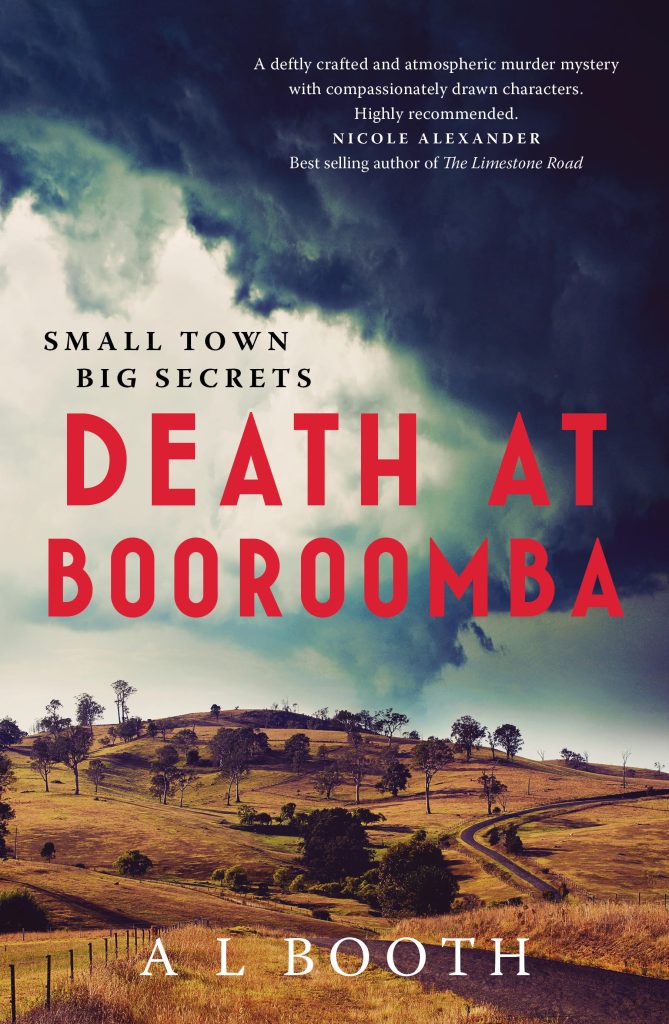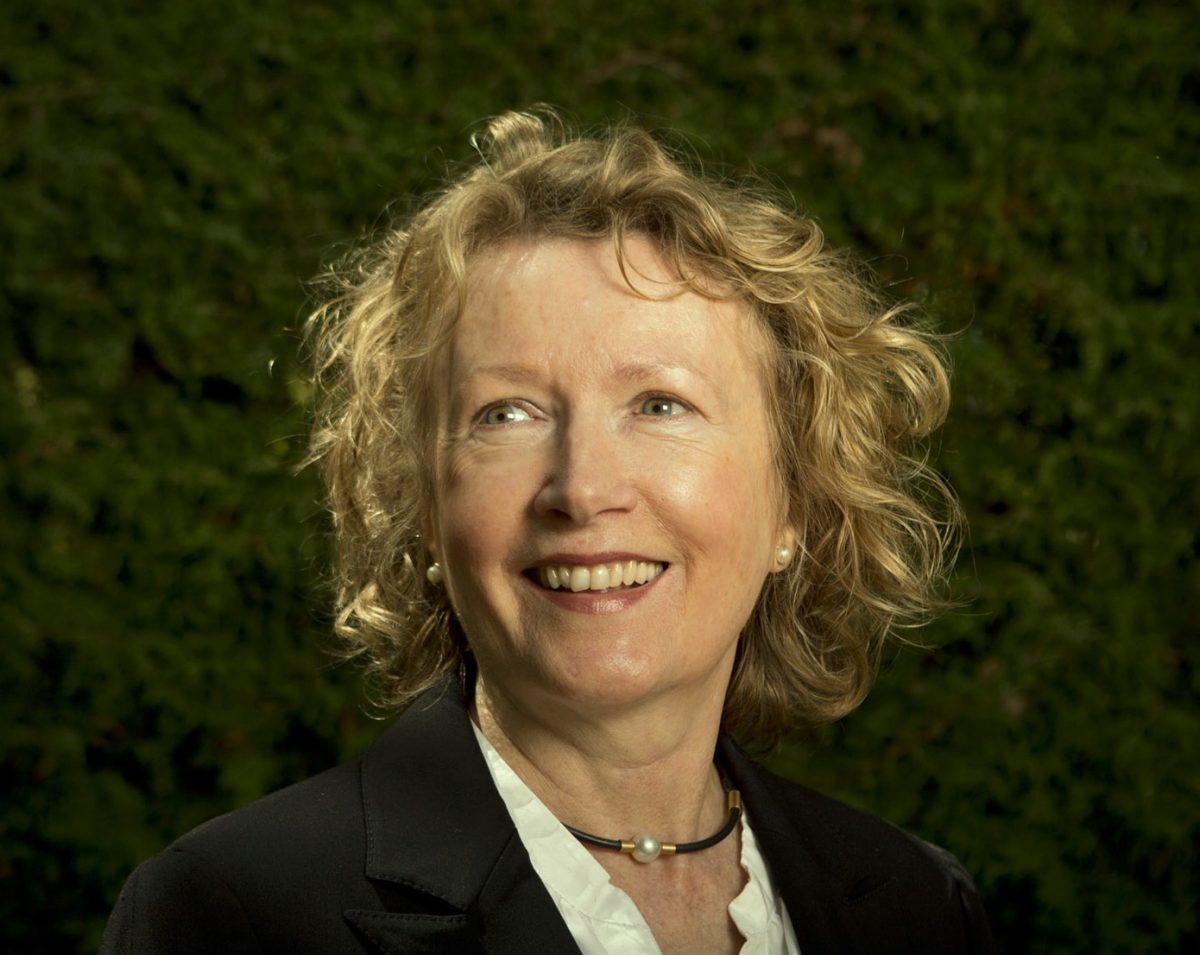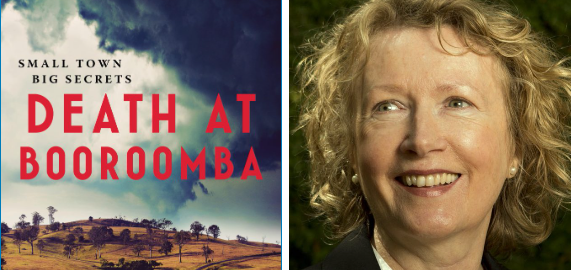Alison L. Booth, a prominent Australian labor economist and celebrated novelist, has just published a new novel, Death at Booroomba (Ventura Press, 2025). “Small town, big secrets.” Here you learn more about this fascinating crime story, the author and how to listen to her story. (Updated: November 30, 2025)
Book Launch: On December 4, 2025, from 9:00 to 10:00 p.m. CET Berlin time (December 4, 2025, 3:00 to 4:00 p.m. EST Philadelphia time; December 5, 2025, 7:00 to 8:00 a.m. AEDT Sydney time), she will present the book online at the Global GLO 2025 Conference
- See LINK for details on how to participate online in the Global GLO 2025 Conference.
- More details about other time zones for this event see the information provided at the end of this post.
- For background on the book and on Booth, please read her short bio below and the accompanying interview.
- More information about the book and how to order it: Website of the author.
Short Bio
Alison L. Booth is an Australian labor economist and novelist whose career bridges rigorous research, institution-building, and literary authorship. She was born in Melbourne and raised in Sydney, and she earned an MSc (1980) and PhD (1984) from the London School of Economics, writing a dissertation on the microeconomics of trade unions and membership.
Over the subsequent decades she held academic posts across the United Kingdom before becoming Professor of Economics at the University of Essex in the mid-1990s; she joined the Australian National University in 2002 and is now Emeritus Professor as well as an ANU Public Policy Fellow (since 2012). Her research sits at the intersection of labor economics, experimental and behavioral economics, and the economics of gender, with publications in leading outlets including the Quarterly Journal of Economics, the Economic Journal, the Review of Economics and Statistics, the Journal of the European Economic Association, the European Economic Review, and the Journal of Economic Behavior & Organization. Her monograph, The Economics of the Trade Union (Cambridge University Press, 1994; reprinted 2002), was selected as a Princeton University Economics Book of the Year in 1996.
She has led the profession as editor-in-chief of Labour Economics (1999–2004) and president of the European Association of Labour Economists (2006–2008), and she continues to contribute through various editorial-board services. Her distinctions include election as a Fellow of the Academy of Social Sciences in Australia (2005), election to the Econometric Society (2019), and the Economic Society of Australia’s Distinguished Fellow Award (2017).
In parallel with her academic work, Booth has developed a distinctive voice as a novelist of historical and social worlds. Her titles include Stillwater Creek (2010), The Indigo Sky (2011), A Distant Land (2012), A Perfect Marriage (2018), The Philosopher’s Daughters (2020), The Painting (2021), Bellevue (2023), and Death at Booroomba (2025). This dual profile, grounded in evidence-based economics and enriched by storytelling, underpins her ongoing engagement with public policy and research translation.
The INTERVIEW with questions by Klaus F. Zimmermann
From Economics to Fiction: You have spent years as a professor of economics. What sparked your transition from analyzing labor markets to crafting sound historical literature? Was there a moment that made you say, “Now I write novels”? How did you know that it was not just a sabbatical experiment?
- Alison L. Booth: I had always wanted to write a novel – some sort of drive at self-expression, I suppose. My father, whose own novel was published in 2002, supported me in my writing ambitions. Initially I wrote short stories and novel-writing followed. My first publisher, Penguin Random House, nudged me into a three-book deal and, after recovering from that shock, I developed a habit of writing. I didn’t view fiction writing as a career-change but I did view it as an activity that I might enjoy after retirement when I would have more time for contemplation.
Bridging Two Worlds: Has your background in economics influenced your storytelling, perhaps in how you find topics, build characters, explore social dynamics, or structure suspense?
- Alison L. Booth: The analytical thinking that is necessary to become an economist is very useful for plot construction but what is lacking in economics – but is essential in good fiction – is evocative writing and emotional depth. This is not to say economists are unemotional: there are plenty of examples of deeply compassionate individuals attracted into labour economics and other sub-fields of our discipline.
Literary Milestones: Several of your seven earlier novels have appeared with Penguin Random House. What did these publishing experiences teach you about your audience? What has surprised you most about the literary world compared to academia?
- Alison L. Booth: Publishing with PRH, one of the Big Five publishers, made me realise that large publishing houses’ acquisition boards are dominated by marketing executives and accountants. The bottom line for an author at one of the Big Five is how many copies your most recent book sold. While small independent fiction publishers are more likely than the Big Five to take risks with their authors, they are also more likely to go into liquidation.
Place as a pressure cooker: Your fiction often returns to small-town Australia with vivid details. What draws you to these settings, and how do they shape the emotional and moral landscape of your stories?
- Alison L. Booth: I view small-town Australia as a microcosm of Australian society where it is perfectly natural to have in a single location a diverse set of individuals from different classes, religious backgrounds and ethnicities. Such individuals inevitably meet one another – the town is like a stage – and diverse individuals make characters and conflicts more interesting. Introducing a newcomer to a small town is a handy way making things happen. Moreover, the small-town situation offers a wonderful setting for a murder mystery. But I have published three novels in very different locations – Sydney and Budapest, London, and the remote colonial outback.
Inside “Death at Booroomba”: Set in Australia around WWI, the novel opens with Jack O’Rourke saving a drowning man in Sydney Harbor. Later, as a returning soldier, he inherits the man’s property and a murder mystery unfolds. What sparked that premise, and which themes, such as trauma, trust in institutions, or class, drove your writing?
- Alison L. Booth: I wanted to offer my protagonist Jack O’Rourke an opportunity to recover from his traumatic wartime experiences by tracking down the murderer of the old man whom he’d saved prewar from drowning and who had in turn been kind to him. In so doing Jack would see there could be some justice in a topsy-turvy world and some possibility of restoration of institutional trust. Writing this novel connected me to earlier generations of Australians and also to the history I had studied as a schoolgirl.
Why economists should read this: What will an academic economist or a policy researcher recognize in Death at Booroomba about, for example, incentives, information asymmetry, or institutional failure? If you had to pitch the book to a seminar room, what’s the one insight you think they will argue about after reading? Is this different from what you expect general readers to take away?
- Alison L. Booth: Academic economists will recognize in Death at Booroomba rent-seeking with asymmetric information, principal-agent problems associated with policing a remote community, and institutional failure when a young doctor is unable to distinguish murder from a death in a pandemic. I believe these issues are far more likely to be recognized as such by academic economists than the average non-economist.
Advice for the Crossroads: What advice would you give to professionals considering a creative leap, whether in academia or elsewhere? What have you learned about risk, reinvention, and resilience through your journey?
- Alison L. Booth: Professional economists have a big advantage in the sense that establishing a career in academic economics develops writing skills and also teaches resilience and a willingness to take creative risks – though of course individuals with those characteristics and an obsession with ideas have arguably self-selected into the discipline. As an economist I also know that a young person starting out with the goal of writing fiction full-time would be following an incredibly risky strategy. My advice is don’t do it until you are well-established in your profession.


Time Conversion –December 4, 2025, from 21:00 to 22:00 CET
Not your zone? Check Time Zone Converter to orient yourself.
| City | Time Zone (UTC Offset) | Local Time Equivalent |
|---|---|---|
| Philadelphia, USA | EST (UTC−5) | 15:00–16:00 (3–4 PM) |
| Los Angeles, USA | PST (UTC−8) | 12:00–13:00 (12–1 PM) |
| Mexico City, Mexico | CST (UTC−6) | 14:00–15:00 (2–3 PM) |
| Brasília, Brazil | BRT (UTC−3) | 18:00–19:00 (6–7 PM) |
| Buenos Aires, Argentina | ART (UTC−3) | 18:00–19:00 (6–7 PM) |
| Auckland, New Zealand | NZDT (UTC+13) | 09:00–10:00 (Dec 5) |
| Sydney, Australia | AEDT (UTC+11) | 07:00–08:00 (Dec 5) |
| Seoul, Korea | KST (UTC+9) | 05:00–06:00 (Dec 5) |
| Tokyo, Japan | JST (UTC+9) | 05:00–06:00 (Dec 5) |
| Beijing, China | CST (UTC+8) | 04:00–05:00 (Dec 5) |
| Bangkok, Thailand | ICT (UTC+7) | 03:00–04:00 (Dec 5) |
| Istanbul, Turkey | TRT (UTC+3) | 23:00–00:00 (Dec 4–5) |
| Cairo, Egypt | EET (UTC+2) | 22:00–23:00 (Dec 4) |
| Cape Town, South Africa | SAST (UTC+2) | 22:00–23:00 (Dec 4) |
| Nairobi, Kenya | EAT (UTC+3) | 23:00–00:00 (Dec 4–5) |

